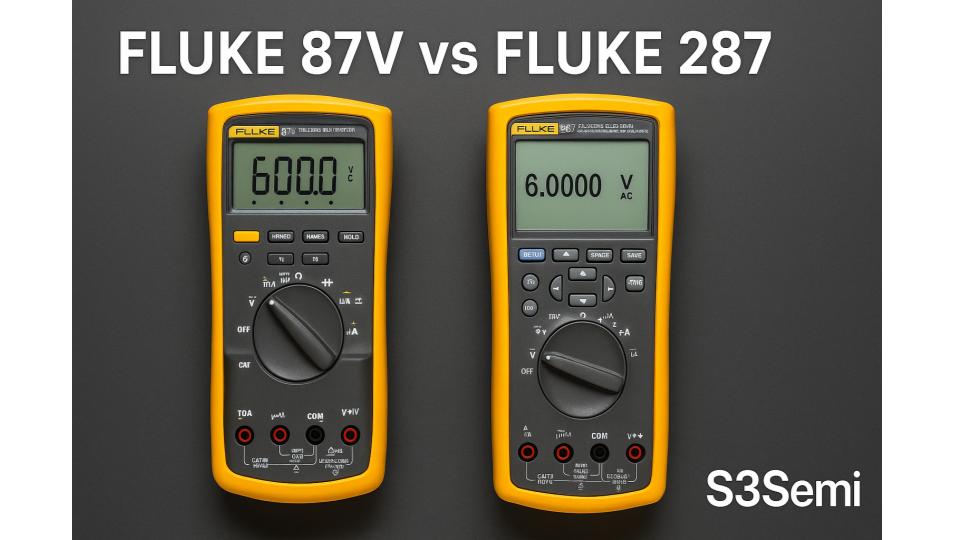When it comes to professional multimeters, the Fluke 87V and the Fluke 287 are two of the most advanced models in Fluke’s lineup.
🏷️ Fluke Multimeter Deals ⭐⭐⭐⭐
Both are True-RMS, highly accurate, and designed for demanding electrical and electronic work. But while they share similarities, they target different kinds of professionals.
Let’s break them down.
📋 Quick Overview
- Fluke 87V: The workhorse of the Fluke lineup, designed for industrial electricians and field engineers. Known for its rugged build, CAT IV safety rating, and low-pass filter for troubleshooting motor drives.
- Fluke 287: A precision logging multimeter with a high-resolution display, data logging, and graphing capabilities. Built for R&D engineers, electronics troubleshooting, and advanced diagnostics.
📊 Fluke 87V vs Fluke 287 Comparison Table
| Feature | Fluke 87V | Fluke 287 |
|---|---|---|
| Display | 20,000-count dual LCD | 50,000-count dot-matrix LCD with trend graph |
| True-RMS | Yes | Yes |
| AC/DC Voltage | Up to 1000V | Up to 1000V |
| Current Measurement | Up to 20A (30s overload) | Up to 10A |
| Resistance | Up to 50 MΩ | Up to 500 MΩ |
| Capacitance | Up to 9,999 µF | Up to 100 mF (100,000 µF) |
| Frequency | Up to 200 kHz | Up to 1 MHz |
| 💳 Pricing | 💲Check Price | 💲Check Price |
| Temperature Measurement | Yes (with probe) | Yes (with probe) |
| Special Features | Low-pass filter, peak min/max (250 µs), rugged build | Data logging, USB connectivity, onboard graphing |
| Safety Rating | CAT III 1000V, CAT IV 600V | CAT III 1000V, CAT IV 600V |
| Battery Type | 9V | 6 × AA |
| Target User | Industrial electricians, field technicians | R&D engineers, electronics troubleshooting |
✅ Pros & Cons of Fluke 87V
Pros
- Extremely rugged and field-ready
- High safety rating (CAT IV 600V)
- Handles up to 20A
- Excellent for industrial applications (motors, drives, power systems)
- Faster response for field diagnostics
Cons
- Limited logging and analysis features
- Lower display resolution than the 287
- Bulkier compared to mid-range Fluke models
✅ Pros & Cons of Fluke 287
Pros
- High-resolution 50,000-count display
- Trend graphing directly on the meter
- Advanced data logging with USB export
- Wider resistance, capacitance, and frequency ranges
- Ideal for lab work and R&D diagnostics
Cons
- Slower boot and response compared to 87V
- More expensive
- Less rugged for field use
- Heavier due to AA battery pack
🛠️ Which One Should You Choose?
- Choose the Fluke 87V if you’re an industrial electrician, field engineer, or maintenance professional who needs a rugged, reliable, and fast meter for motors, drives, and power systems.
- Choose the Fluke 287 if you’re an electronics engineer, R&D professional, or advanced troubleshooter who needs logging, graphing, and lab-grade precision.
In short:
- 87V = Rugged field multimeter for industrial use
- 287 = Precision lab multimeter for advanced analysis




